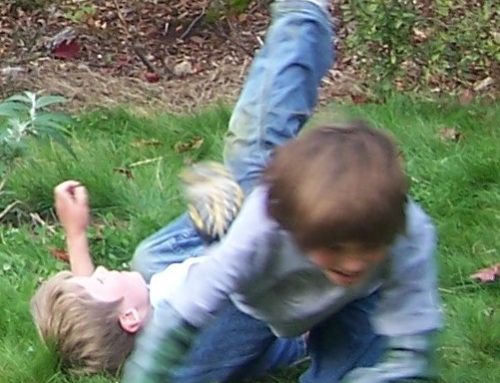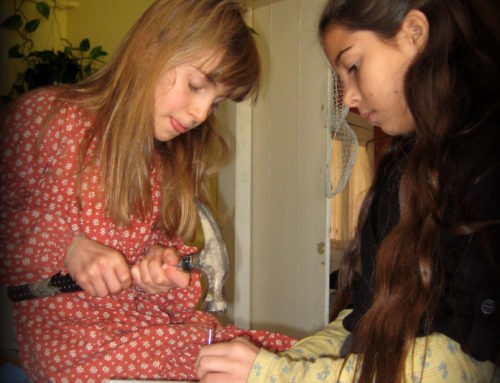I have come to believe that the current social construction of childhood puts children in a position of subordination to adult authority in ways that are both oppressive and limiting. It teaches fear of and obedience to external authority rather than fostering freedom and promoting the capacity for independent thinking, mutual respect and self-responsibility. Given this, how can we construct childhood in a way that is not controlling or oppressive; that gives children power over their own lives; that builds relationships of mutual respect and cooperation (between younger and older people); and promotes freedom and self-determination for society’s youngest members? Together, let us create a new Paradigm for childhood.
Old Paradigm:
*Parents have absolute Power
*Age= Superiority, “respect your elders”
*Children have no independent rights to being
*Nurturance rights, vs. self-determination rights
*Rhetoric and ideology about children
*Black/White Right/Wrong Good/Bad
*People as naturally deviant, human nature as bad/evil
*“For your own good”, children acted upon
*Children as irrational
*Children as not moral beings
* “Spare the Rod, Spoil the child” punishment/reward
*Political Totalitarianism, Dictatorship
*Might makes right
*Authority, force, coercion, punishment- power over
*Domination Model
*Valuing obedience to authority
*Control
New Paradigm:
*Power is shared. Power with not power over.
*Young not = inferior, difference not = deficient
*Children as people in their own right with autonomous rights to being
*Engaged partnership: children have self-determination rights but also need support and nurturing.
*Allowing children to be themselves, putting aside pre-conceived notions
*Multiplicity of reality, many ways of being and of constructing meaning
*Human nature malleable and shaped by experience…
*Children as actors in their own lives, not solely to be acted upon
*Children have useful knowledge, insight and perspective
*Children as developing people
*Compassion and education
*Democratic values, rights of individuals
*Everyone has unalienable rights to being
*Cooperation, recognizing cost of force, power with
*Cooperation Model
*Valuing self-governance
*Freedom
Some questions and perspectives to keep in mind that can help guide us toward a new Paradigm:
Are we…
1.Enforcing inequality (limiting) or bringing into parity (expanding)?
This includes attitudes that treat children with a different quality of respect or limit them simply because they are children.
2.Exerting power over or sharing power with?
This includes the question of whether children are only being acted upon or are also actors in their own lives. Exerting power over can be seen as a form of coercion and control while sharing power with involves cooperation and mutual respect.
3.Cultivating obedience to authority over trust in self?
Are we teaching children to override their own instincts and internal senses to obey authority or are we helping them cultivate inner trust that can evaluate other’s input and determine its value?
One of the worst things about arbitrary authority is it makes us lose our trust in natural authority- people who know what they are doing and could share a lot of wisdom with us. When they make you obey the cruel and unreasonable [authority] they steal your desire to learn from [or listen to] the kind and reasonable [authority]” (Llewellyn, 1991, p. 41).


Hi Elana — this is totally inspiring to me. Since I’ve encountered NVC and now restorative circles, I’ve been shifting my parenting to power with. It has been difficult and lonely and scary but now I feel that I am over the hump and in a place of integrity (finally!). I am so happy that your blog will be a source of support. I want to devote my life to this too – I have three sons, 16, 18, 21. Thank you for sharing it!!! Lee
Love it! This is so right on and so in alignment with my values and vision. Keep up the good work and I look forward to reading more.
[…] We attempt to keep kids so “safe” that we limit them from exploration and learning. New skills and new tasks that have some level of risk involved are seen as too dangerous and with “safety” limitations kids cannot master more risky tasks. Predetermining what is safe and what is not for children, we decide their limits and do not give them the chance to test or expand the limits of their current capabilities (which may be entirely different from what we think they are). We also limit them from developing abilities in areas where they may at first have limited skills. “By assuming they do lack the capability[…] we restrict their behavior and give them little opportunity to demonstrate or further develop such a capability” ( Ann Palmeri). In this way we are using children’s lack of knowledge and skill as justification for maintaining inequality rather than allowing children opportunities that would move toward equality and bring them into parity. (see Post: A New Paradigm for Childhood) […]